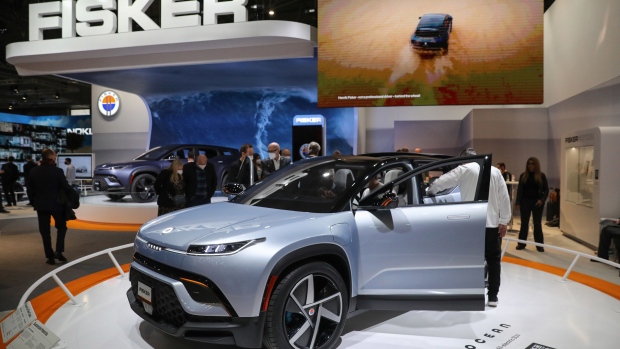Apr 26, 2022
Fisker SUV Demand Has CEO Hoping Partner Triples Production After Next Year
, Bloomberg News

(Bloomberg) -- Fisker Inc. hopes to boost production capacity at partner Magna International Inc.’s plant in Austria to 150,000 vehicles from 2024 as reservations for its first electric car surge.
The startup has taken more than 40,000 reservations for the Ocean sport utility vehicle that starts at $37,499. The company expects as many as double that by year-end, Chief Executive Officer Henrik Fisker said in an interview.
Magna, a Canadian-American contract manufacturer that’s building vehicles including BMW AG’s 5 Series sedan and Mercedes-Benz AG’s G-class SUV at its factory in Graz, will start assembling the Ocean in November. In 2020, the companies signed an agreement to make 50,000 units at the plant in 2023 and the CEO said he’s confident Magna could triple output the following year.
Fisker is part of a crop of electric-vehicle hopefuls seeking to break into the automaking major league as the shift to battery-powered cars accelerates. The company is bullish on its production prospects in part because of its close relationship with Magna, which holds a 6% stake in the newcomer.
MORE: Fisker CEO’s Twitter Account Disappears After Musk Acquisition
“Big carmakers are now working on their second major models, incorporating lessons learned, and many of those will hit the market from 2025,” Fisker said. “Between now and then, we have a chance to get in.”
Trading Risks
Still, investing in the space isn’t for the faint-hearted. Rivian Automotive Inc., which went public in November, has plummeted from a valuation of over $100 billion, while Lordstown Motors Corp. is trading at a fraction of its debut price. Fisker, which went public via a merger with a blank-check company, is trading at less than half of its peak in November and currently has a market capitalization of around $3.3 billion.
The Ocean, which Fisker showed off to European customers at a conference in Barcelona earlier this year, will have to compete with vehicles including Volkswagen AG’s ID.4 and Tesla Inc.’s Model Y. The car comes in three versions with two different battery types. The base offering uses cheaper lithium-ion-phosphate cells, helping Fisker navigate some of the price surges for raw materials, especially nickel, the executive said.
The manufacturer is also working on its second model, the Pear, which it plans to build in the U.S. with partner Foxconn Technology Group.
©2022 Bloomberg L.P.





